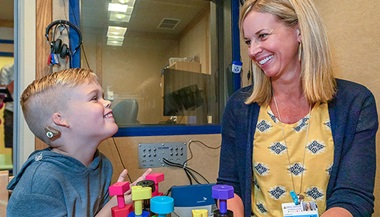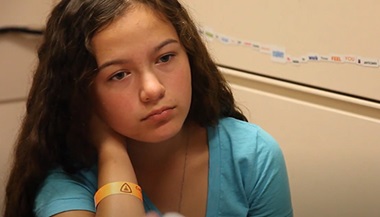Usher Syndrome
What is Usher syndrome in children?
Usher syndrome is a disorder that is passed down through families (inherited). A syndrome is a group of recognizable symptoms that happen together. Usher syndrome includes both hearing loss and vision loss. The hearing loss may be mild to complete. The vision problem is called retinitis pigmentosa. The retinas of the eyes are slowly damaged over time. The retinas receive light and play a very important part in being able to see. Usher syndrome is the most common childhood condition that affects both vision and hearing. It can also be called deafness-retinitis pigmentosa syndrome, Graefe-Usher syndrome, Hallgren syndrome, and retinitis pigmentosa-deafness syndrome.
What causes Usher syndrome in a child?
Usher syndrome is passed on from unaffected parents to their children. It may be inherited when both parents are carriers of an abnormal (harmful) gene. If both parents have a harmful change in the same gene, they have a 1 in 4 chance of having a child with Usher syndrome with each pregnancy.
What are the symptoms of Usher syndrome in a child?
Symptoms depend on the type of Usher syndrome. But they often include problems with hearing or deafness, balance, and eyesight or blindness. There are several types and many subtypes of the syndrome. Generally, three types are identified:
-
Type 1. This includes deafness (profound hearing loss) at birth and severe balance problems that cause trouble sitting or walking. Vision problems often begin before the child is 10 years old. Trouble seeing at night is often the first vision problem noted. The child's vision gets worse as they grow.
-
Type 2. This includes moderate to severe hearing loss but no balance problems. Vision problems often are found during the late teens.
-
Type 3. This includes normal to near-normal hearing and balance at birth. The child may develop balance problems as they get older. Hearing and vision problems often occur during the teen years. By the time the child reaches middle adulthood, they may be legally blind.
Most children diagnosed with Usher syndrome have type 1 or type 2.
How is Usher syndrome diagnosed in a child?
All newborn babies are screened for hearing problems. If a hearing problem is found in a newborn, the baby will have follow-up testing. Your child's healthcare provider will test hearing, eyesight, and balance to diagnose Usher syndrome. The tests include:
-
Electronystagmography (ENG). This test checks eye movements to help diagnose balance problems.
-
Vision testing. Different tests are used to test the eyesight of very young children.
-
Eye exam. An eye care provider will look at the retina during an eye exam.
-
Electroretinography (ERG). This test checks how the retina reacts to light. It is used to diagnose retinitis pigmentosa.
-
Hearing evaluation. A hearing specialist will examine the ear. They will also do a series of tests to check your child’s hearing.
Once a child is diagnosed, they may have genetic testing to find out the type of Usher syndrome.
How is Usher syndrome treated in a child?
Treatment will depend on your child’s symptoms, age, and general health. It will also depend on how bad the condition is.
Usher syndrome has no cure. Spotting it early is very important. Then support, early intervention programs and education can begin as soon as possible. Treatment may include:
-
Cochlear implants
-
Hearing aids
-
Hearing or auditory training
-
Low vision support
-
Speech, physical, and occupational therapy
-
Orientation and mobility training to help with balance
-
Counseling to help you and your child deal with a long-term health problem
How can I help my child live with Usher syndrome?
The hearing, vision, and balance problems may get worse over time. Your child will need ongoing care and support, as their needs change. For some children with Usher Syndrome, the number and complexity of their disabilities (hearing, vision, and balance) means they may face problems with language, social, and cognitive development. Because of this, it's important to get early intervention, keep all follow-up appointments, and learn about their rights to educational support and reasonable accommodations in the public school system. This will offer them the best chance for success.
When should I call my child’s healthcare provider?
Call your child’s healthcare provider if you notice your child having trouble with their eyesight, hearing, or balance. If Usher syndrome has been diagnosed, call your provider if symptoms get worse.
Key points about Usher syndrome in children
-
Usher syndrome is an inherited problem that includes hearing loss, vision loss, and balance problems.
-
It's passed on from unaffected parents to their children.
-
If both parents are carriers for a harmful change to the same gene, they have a 1 in 4 chance of having a child with Usher syndrome with each pregnancy.
-
Hearing, vision, and balance tests are used to diagnose Usher syndrome.
-
There is no known cure for Usher syndrome.
-
Finding the syndrome early is important. Then support and early intervention education programs can begin as soon as possible.






